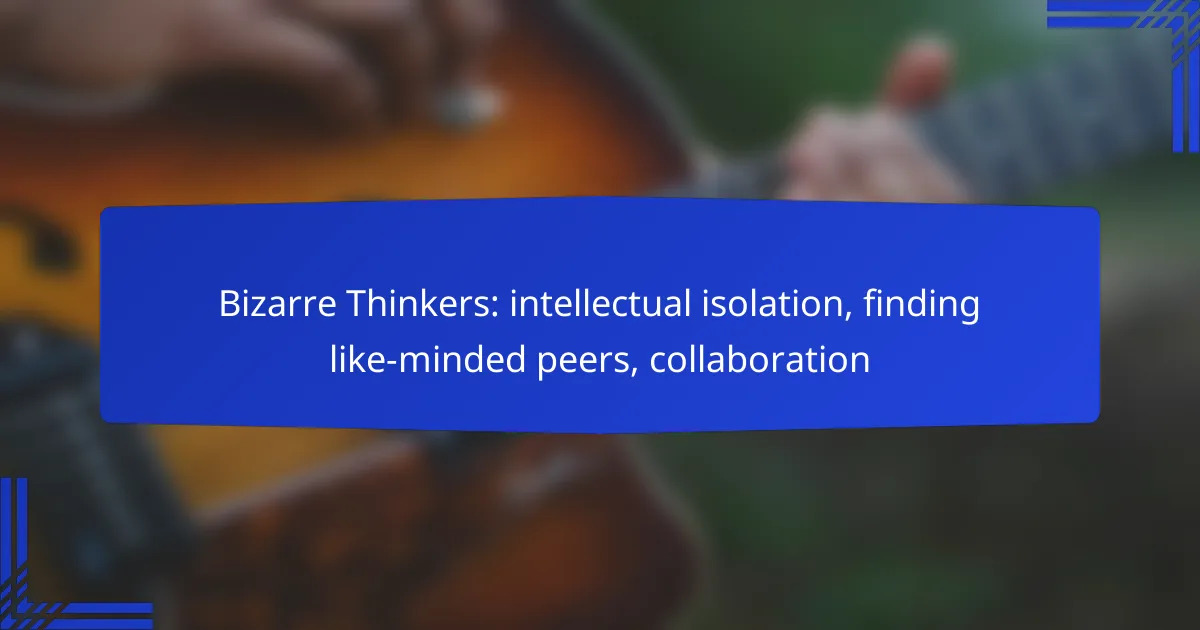Bizarre thinkers often face intellectual isolation, but they can find connection and collaboration through various platforms and gatherings tailored to unconventional ideas. By engaging in online forums, local meetups, and social media groups, they can build supportive networks that foster creativity and innovation. Collaboration not only helps overcome barriers but also enriches their perspectives, leading to personal and professional growth.

How can bizarre thinkers find like-minded peers in Canada?
Bizarre thinkers in Canada can connect with like-minded peers through various platforms and gatherings that cater to unique interests and unconventional ideas. Engaging in online forums, attending local meetups, and joining social media groups are effective ways to build a supportive network.
Online forums and communities
Online forums and communities provide a space for bizarre thinkers to share ideas, ask questions, and collaborate on projects. Websites like Reddit, particularly subreddits focused on niche topics, allow users to engage with others who share their unconventional interests.
Additionally, platforms such as Discord host various servers dedicated to specific themes, where members can participate in discussions and share resources. Joining these online communities can help individuals find peers who resonate with their unique perspectives.
Local meetups and workshops
Local meetups and workshops are excellent opportunities for bizarre thinkers in Canada to connect face-to-face. Websites like Meetup.com can help individuals find gatherings focused on unconventional topics, from art to technology.
Participating in workshops not only fosters collaboration but also allows for skill-sharing and networking. Attendees can meet others who think outside the box, leading to potential partnerships and creative projects.
Social media groups
Social media groups, particularly on platforms like Facebook and LinkedIn, can be valuable for bizarre thinkers seeking community. These groups often focus on specific interests or unconventional ideas, making it easier to find peers who share similar passions.
Engaging in discussions within these groups can lead to connections that extend beyond the digital realm. It’s important to actively participate and contribute to conversations to build relationships with other members.
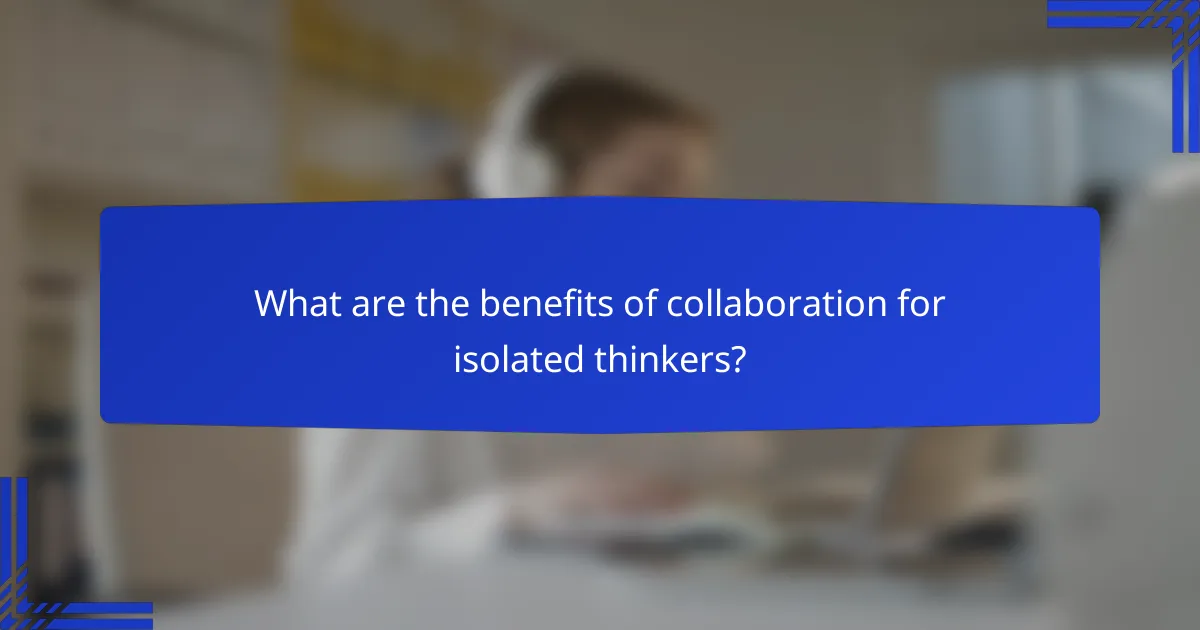
What are the benefits of collaboration for isolated thinkers?
Collaboration offers isolated thinkers a chance to enhance their ideas and overcome intellectual barriers. By working with others, they can tap into shared knowledge and creativity, leading to innovative solutions and personal growth.
Enhanced creativity
Collaborating with others can significantly boost creativity by combining different ideas and approaches. When isolated thinkers engage with peers, they often experience a spark of inspiration that can lead to unique solutions or artistic expressions.
For instance, brainstorming sessions can generate a wide array of concepts that an individual might not have considered alone. This collective creativity can result in projects that are richer and more complex than what one person could achieve independently.
Access to diverse perspectives
Collaboration provides isolated thinkers with access to a variety of viewpoints, which can challenge their assumptions and broaden their understanding. Engaging with individuals from different backgrounds or fields can introduce new methodologies and insights that enhance problem-solving capabilities.
For example, a scientist collaborating with an artist may discover innovative ways to present data visually, making complex information more accessible. This cross-pollination of ideas can lead to breakthroughs that would be difficult to achieve in isolation.
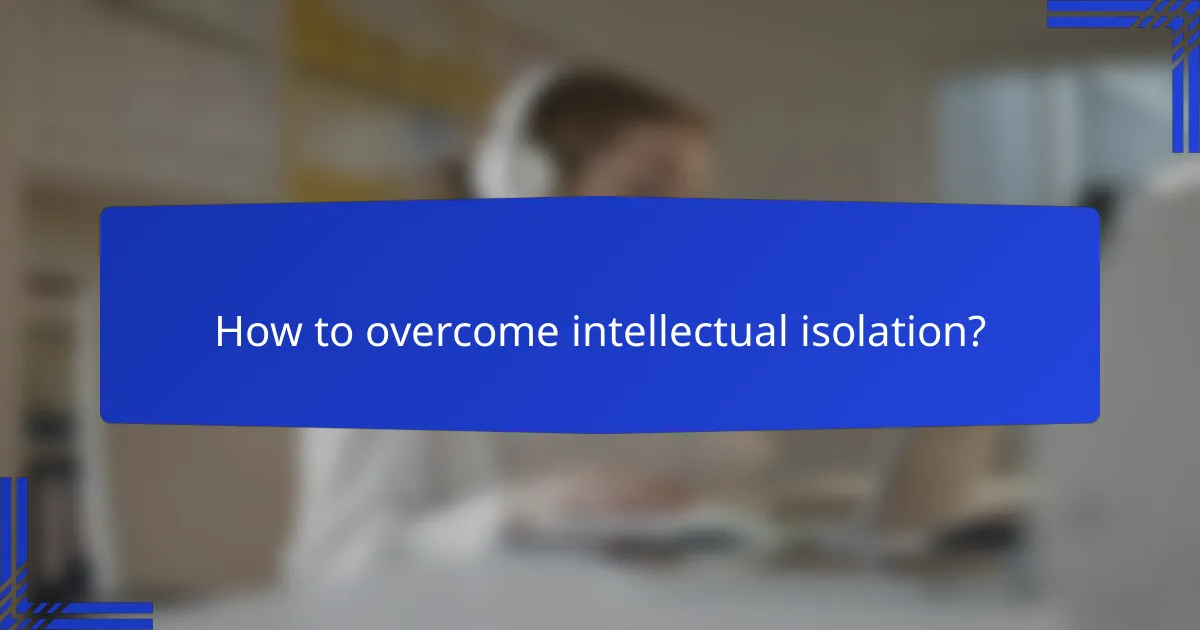
How to overcome intellectual isolation?
Overcoming intellectual isolation involves actively seeking out connections with like-minded individuals and engaging in collaborative projects. This can enhance creativity and provide diverse perspectives, which are essential for personal and professional growth.
Engaging in interdisciplinary projects
Participating in interdisciplinary projects allows individuals to collaborate across different fields, fostering innovative ideas and solutions. These projects often bring together experts from various domains, creating an environment where unique insights can emerge.
Consider joining initiatives that combine your expertise with other disciplines, such as technology and art or science and social studies. This approach not only broadens your knowledge but also helps you build a network of diverse thinkers.
Joining think tanks and discussion groups
Think tanks and discussion groups provide platforms for sharing ideas and debating various topics with peers who share similar interests. These gatherings can range from formal organizations to informal meetups, allowing for flexibility in participation.
Look for local or online groups that focus on your areas of interest. Engaging in regular discussions can help you refine your thoughts, gain new perspectives, and combat feelings of isolation. Be proactive in contributing to conversations and seek out opportunities to collaborate on projects that arise from these discussions.

What platforms facilitate collaboration among thinkers?
Several platforms effectively facilitate collaboration among thinkers, allowing them to connect, share ideas, and work together. Tools like Slack and Discord cater to different needs, enabling creative teams and niche communities to thrive through focused communication and collaboration.
Slack for creative teams
Slack is designed for professional environments, making it an ideal choice for creative teams looking to collaborate efficiently. It offers organized channels for specific projects, allowing team members to share files, discuss ideas, and integrate various productivity tools.
To maximize Slack’s potential, set clear guidelines for channel usage and encourage regular updates. Utilize features like reminders and polls to keep everyone engaged and aligned on project goals. Consider integrating apps like Trello or Google Drive to streamline workflows.
Discord for niche communities
Discord serves as a versatile platform for niche communities, providing voice, video, and text chat options. It allows users to create servers tailored to specific interests, making it easy for like-minded thinkers to connect and collaborate on shared projects.
When using Discord, establish clear rules for engagement to maintain a positive atmosphere. Take advantage of bots to automate tasks and enhance community interaction. Regular events, such as brainstorming sessions or Q&A discussions, can further strengthen collaboration among members.
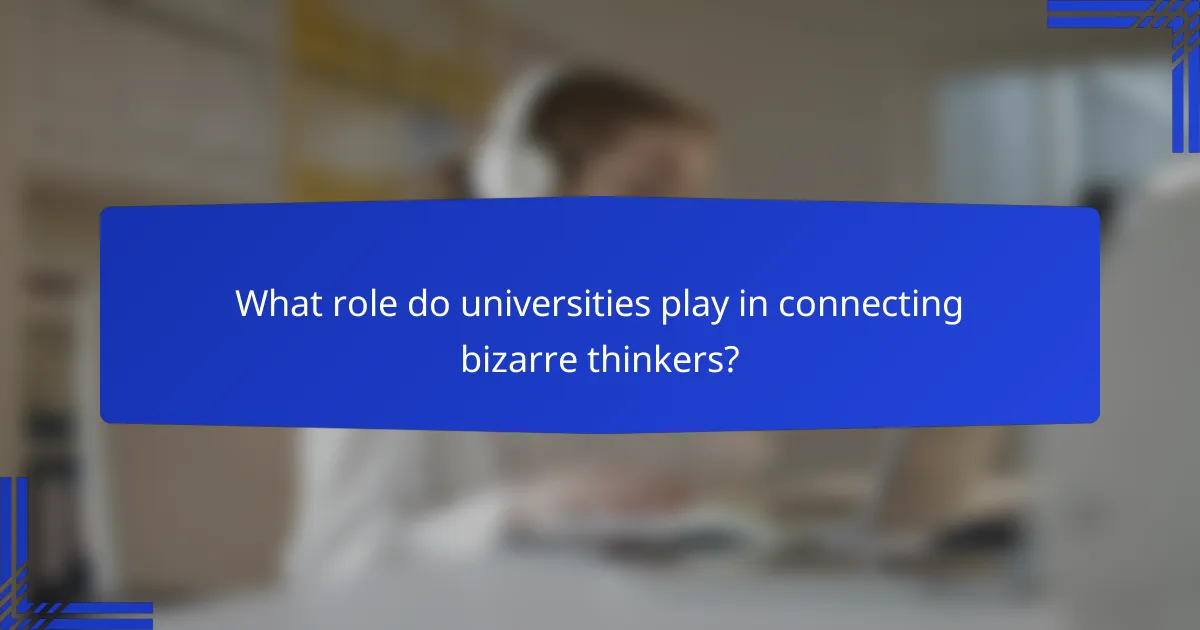
What role do universities play in connecting bizarre thinkers?
Universities serve as vital hubs for bizarre thinkers, providing platforms for intellectual exchange and collaboration. They facilitate connections through structured programs, informal gatherings, and shared resources, allowing unique minds to find like-minded peers.
Research collaborations
Research collaborations in universities often bring together diverse thinkers to tackle unconventional problems. These partnerships can span various disciplines, encouraging innovative approaches and cross-pollination of ideas. For instance, a physicist might collaborate with an artist to explore the intersection of science and visual expression.
To maximize the benefits of research collaborations, consider joining interdisciplinary teams or participating in grant proposals that invite unconventional ideas. Universities frequently offer funding opportunities for such projects, making it easier to pursue unique research paths.
Public lectures and seminars
Public lectures and seminars at universities provide platforms for bizarre thinkers to share their ideas with a broader audience. These events often attract individuals from various fields, fostering discussions that can lead to new insights and collaborations. Attending or speaking at these events can help individuals connect with others who share their unconventional perspectives.
To engage effectively, prepare thought-provoking questions and be open to diverse viewpoints. Universities typically host these events regularly, so check their calendars for upcoming opportunities that align with your interests.
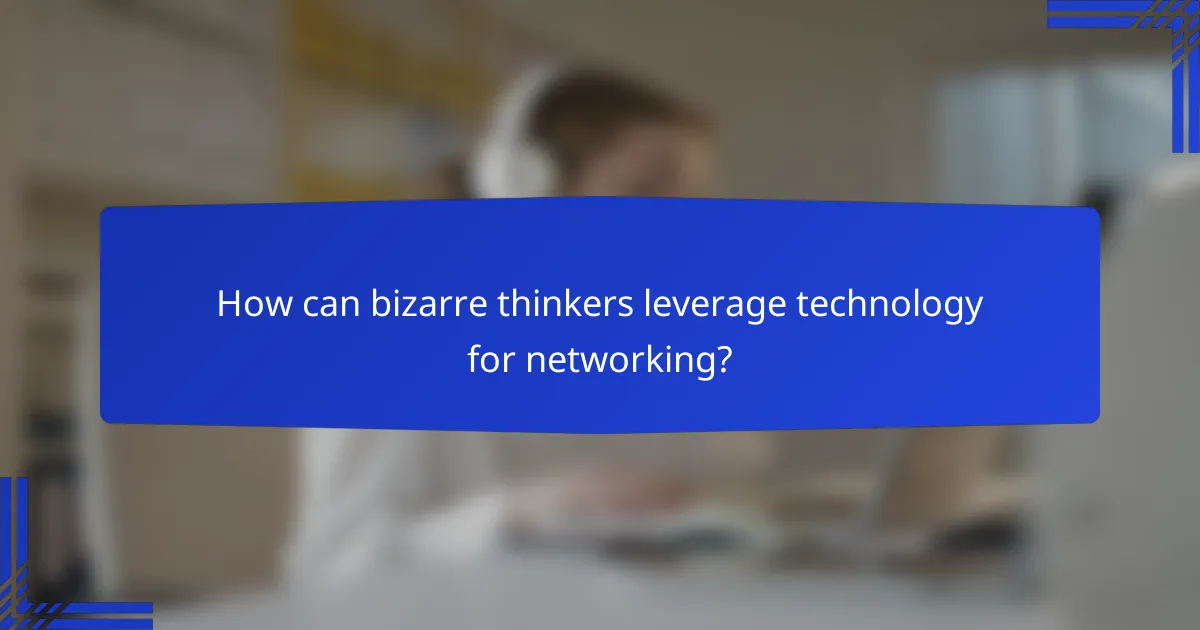
How can bizarre thinkers leverage technology for networking?
Bizarre thinkers can utilize technology to connect with like-minded individuals and foster collaboration. By engaging in virtual environments and using online tools, they can break through geographical barriers and find peers who share their unique perspectives.
Virtual reality meetups
Virtual reality (VR) meetups offer immersive experiences that mimic real-life interactions. Platforms like AltspaceVR and VRChat allow users to create avatars and participate in discussions, workshops, or social events in a shared virtual space. This format can enhance engagement and foster deeper connections among participants.
When organizing or attending VR meetups, consider the time zones of participants to maximize attendance. Look for events that focus on niche interests or themes relevant to your ideas, as these will attract more aligned individuals.
Online collaborative tools
Online collaborative tools such as Slack, Discord, and Trello facilitate communication and project management among remote teams. These platforms enable bizarre thinkers to share ideas, brainstorm, and work on projects in real-time, regardless of their physical locations.
To effectively use these tools, establish clear guidelines for communication and collaboration. Regular check-ins and updates can help maintain momentum and ensure that all members are aligned with project goals. Additionally, consider using video conferencing tools like Zoom for face-to-face discussions to strengthen relationships further.
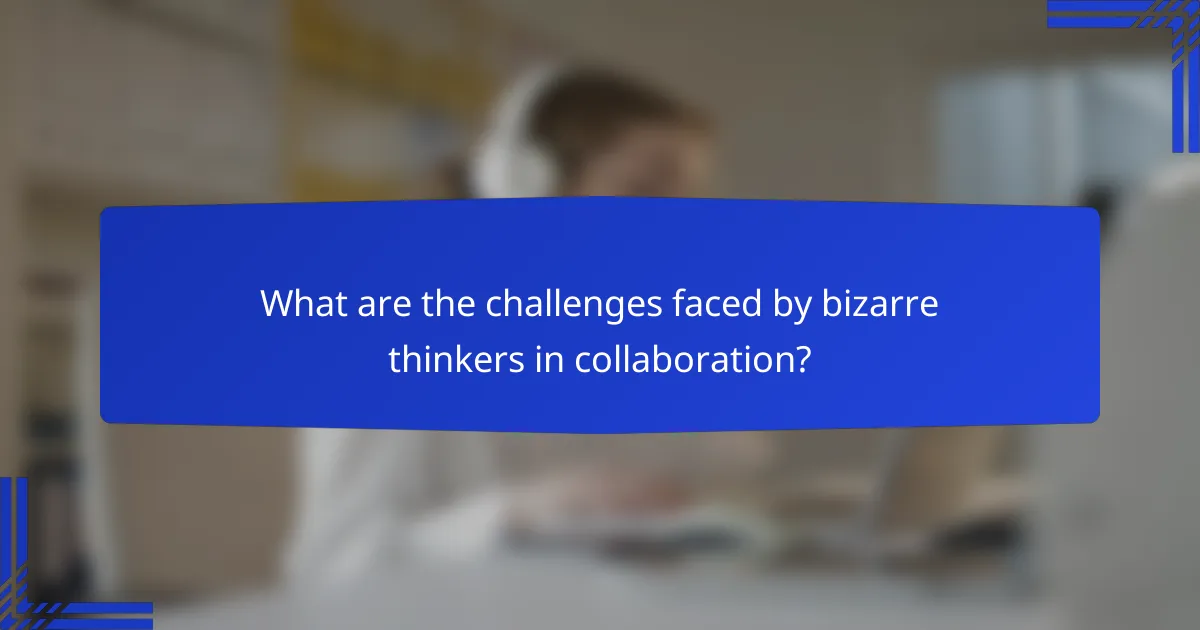
What are the challenges faced by bizarre thinkers in collaboration?
Bizarre thinkers often encounter significant challenges in collaboration, primarily due to their unconventional ideas and perspectives. These challenges can lead to misunderstandings with peers and difficulties in finding collaborators who share their unique vision.
Misunderstanding from peers
Misunderstandings frequently arise when bizarre thinkers communicate their ideas. Their unconventional approaches may seem confusing or impractical to others, leading to misinterpretation of their intentions or concepts.
This disconnect can result in frustration and isolation, as bizarre thinkers may feel their insights are undervalued or dismissed. To mitigate this, they should strive for clarity in communication and seek feedback to ensure their ideas are understood.
Difficulty in finding compatible collaborators
Finding collaborators who resonate with unconventional thinking can be challenging. Bizarre thinkers often need to sift through numerous potential partners to identify those who appreciate and can enhance their unique perspectives.
Networking in niche communities, attending specialized events, or utilizing online platforms dedicated to innovative thinkers can help in locating compatible collaborators. It is crucial to be open to diverse backgrounds, as unexpected partnerships can yield fruitful results.
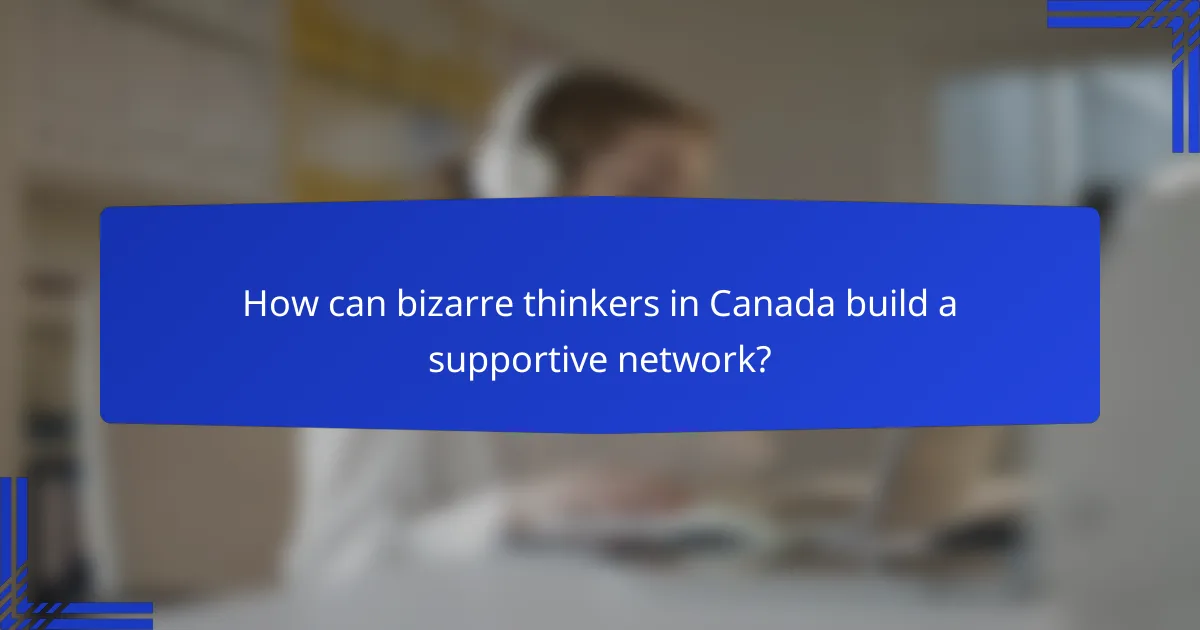
How can bizarre thinkers in Canada build a supportive network?
Bizarre thinkers in Canada can build a supportive network by actively seeking out like-minded individuals and engaging in collaborative projects. Utilizing online platforms and local meetups can foster connections that encourage intellectual growth and creativity.
Finding like-minded peers
To find like-minded peers, consider joining niche online forums, social media groups, or local clubs that focus on unconventional ideas. Websites like Meetup or Eventbrite often list gatherings where unique thinkers congregate, making it easier to connect with others who share similar interests.
Participating in workshops or conferences related to your field can also provide opportunities to meet individuals who think outside the box. Look for events that emphasize creativity and innovation, as these are likely to attract fellow bizarre thinkers.
Collaboration opportunities
Collaboration can significantly enhance the work of bizarre thinkers. Look for opportunities to partner with others on projects that align with your interests, whether through joint research, creative endeavors, or community initiatives. Sharing ideas can lead to unexpected insights and breakthroughs.
Consider forming small groups or think tanks where members can regularly meet to discuss their ideas and provide feedback. This structured collaboration can help refine concepts and foster a sense of community among participants.
Utilizing online platforms
Online platforms such as Discord, Reddit, or specialized forums can serve as excellent resources for bizarre thinkers. These spaces allow for the exchange of ideas and provide a platform for collaboration without geographical limitations. Engage actively by sharing your thoughts and contributing to discussions.
Additionally, consider creating a blog or a YouTube channel to showcase your unique perspectives. This can attract like-minded individuals who resonate with your ideas and may lead to fruitful collaborations.
